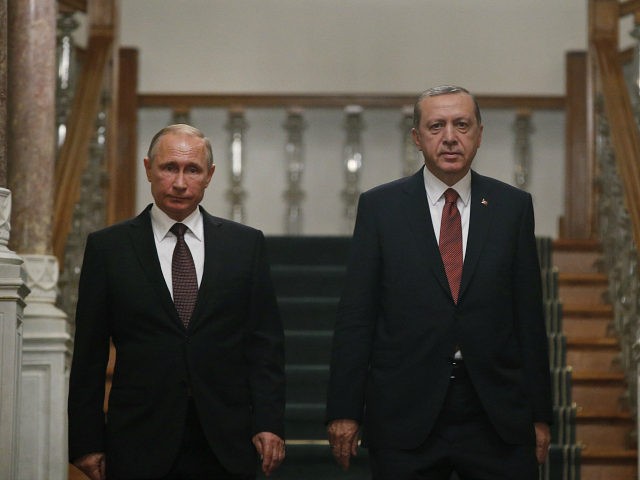Russian President Vladimir Putin arrived in Istanbul, Turkey, on Monday to cement a gas pipeline deal. The business agreement, the Kremlin suggested, would be the beginning of an attempt to rehabilitate the Russia-Turkey bilateral relationship “in all aspects.”
The meeting between Putin and Turkish President Recep Tayyip Erdogan during this visit will be the third such trip since June, when both parties attempted to restore diplomatic relations after their disagreements on the Syrian civil war led to a collapse of diplomacy. In November 2015, the Turkish government shot down a Russian fighter jet after the Russians had repeatedly violated Turkish airspace and ignored warnings from Turkish troops. The Russian military is present in Syria as an ally of dictator Bashar al-Assad, whom Erdogan has previously referred to as “a more advanced terrorist than the Islamic State.”
Reports so far do not indicate that Putin has discussed Syria with his Turkish counterpart. Instead, at remarks at the World Energy Congress, Putin discussed a new gas pipeline. “We look positively at the Turkish Stream project. Our efforts are continuing,” he said, adding a nod acknowledging that Erdogan remained in charge of the country after a failed coup attempt on July 15.
“We are very glad that Turkey is recovering and wish it success,” Putin told the audience. Despite the rift between the two nations over the Russian jet incident, Putin was among the first to reach out to Erdogan following the failure of that coup attempt. As Erdogan blames Islamic cleric Fethullah Gulen, who lives in Pennsylvania, for plotting the coup, Putin’s overture came at a time when Erdogan’s government was expressing strong dissatisfaction with NATO ally America.
While the World Energy Congress will not address the Syrian civil war, Kremlin spokesman Dmitry Peskov said the public should expect the bilateral relationship to improve “in all aspects,” which may mean some agreement on how to approach the Syrian situation.
“It is expected that this visit, which comes as a follow-up to the two leaders’ earlier meetings in St. Petersburg on Aug. 9 and in Hangzhou [China] on Sept. 3 on the sidelines of the G20, will contribute to further improving our cooperation and to accelerating normalization process between Turkey and Russia,” the Turkish government had previously said of the meeting.
As Putin arrived, Turkish Prime Minister Binali Yıldırım said Monday that Turkey and Russia now have “the same point of view” on Syria, without elaborating.
Russia initially entered the Syrian civil war to defend Assad, nominally from the Islamic State. But statistics regarding airstrike locations since Russia began bombing Syria show that they have largely been targeting non-Islamic State anti-Assad opposition. Russia is currently engaged in an extensive bombing campaign targeting civilians in Aleppo, where there is no significantly Islamic State presence.
The UN Security Council attempted to pass a resolution against the bombing of civilians in Aleppo, but as Russia currently holds the presidency of that international body, the resolution was vetoed. Russia claims the resolution would have helped unspecified “terrorists.”
To enhance operations in Syria, Russia announced the establishment of a permanent airbase in that country.
How Erdogan’s longtime opposition to Assad — and calls for a no-fly zone over contested regions, which would significantly deter Russian military operations — will be squared with a desire to invite Russian business into Turkey remains to be seen, though Erdogan has expressed some flexibility on Assad. In August, Erdogan expressed a willingness to allow Assad to participate in peace talks, something that he had adamantly objected to for years.

COMMENTS
Please let us know if you're having issues with commenting.